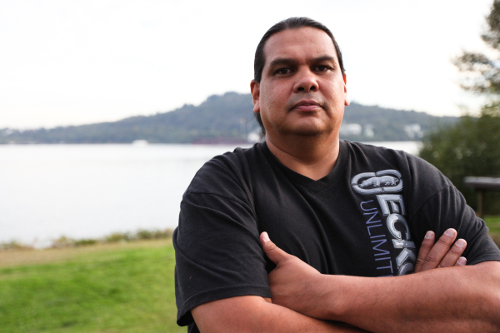SUBSCRIBE TO THE FREE NEWSLETTER
The next pipeline fight: BC First Nations versus big oil
In a detailed, inspiring, and well-researched feature at Cascadia Magazine, Vancouver-based journalist Jerome Turner–who is of Gitxsan descent–reports on the strategies Indigenous groups are using to fight KinderMorgan’s proposed oil pipeline across British Columbia.
Among those profiled is Kanahus Manuel of the Secwe̓pemc Nation, whose father and grandfather were also First Nations activists. Kanahus is part of a movement of protesters taking direct action–in particular, building tiny homes in the path of the proposed pipeline.
In addition, you’ll learn about the work of Reuben George, of the Tseleil Waututh Sacred Trust, who’s fighting on the legal front, taking KinderMorgan and the Canadian government to task for excluding Indigenous people from the planning process, and working to halt a project that will endanger water sources, marine life, wildlife, and Indigenous cultural resources. “All our research showed it is not a matter of if, but when there will be a spill,” George says.
Please set aside some time to read this important feature about activists fighting for climate justice in Cascadia.
Colten Boushie verdict proves it’s a long road to reconiliation
A Saskatchewan court recently reached a not-guilty verdict for a white farmer accused of shooting and killing 22-year-old Colten Boushie, an Indigenous man, in 2016. The case has stirred outrage, especially in Canada’s First Nations communities, as evidence that efforts at reconciliation and confronting racial prejudice in Canada are failing. In an essay for The Tyee, Judith Sayers of the Hupacasath First Nation in Port Alberni, B.C writes that “Words of solace from the prime minister and justice minister are nice, but we need action to eradicate racism from the justice system for true reconciliation in Canada.” In Vancouver, protesters rallied for justice for the Boushie family and First Nations throughout the region.
Expect a fight on TransMountain pipeline
Torrance Coste, writing for Ricochet Media, writes that a noisy protest at Canadian prime minister Justin Trudeau’s town hall meeting on the TransMountain pipeline (which he supports) isn’t the last time things are going to be less than polite: “The process that prioritizes some people and regions over others isn’t polite or respectful and it’s unfair to expect that activism against it always should be.” Meanwhile, Jeremy Nutall at The Tyee reports that stronger environmental regulations passed by the Liberals won’t apply to KinderMorgan’s pipeline.
Seattle hostile architecture targets homeless people
The Seattle Times reports on how the city of Seattle has installed “hostile architecture” in areas frequently used as homeless camps. Noting that the city is spending hundreds of thousands of dollars on fences, rows of un-used bike racks, and other passive-aggressive measures, some city council members are urging the money be used to build housing instead.
Want racial equity? Support automatic voter registration
Oskar Zambrano, writing for the South Seattle Emerald, says the number one thing people can do in Washington state to help promote racial equity is to support a bill promoting automatic voter registration. It works toward a simple goal, he writes: getting every “eligible person registered to vote so that no voter is turned away from the ballot box on Election Day.”
Biologists struggle to save an endangered lily in Oregon
OPB reports on biologists’ efforts to study and spur recovery of the Western lily, a rare plant species that grows in the peat bogs of southern Oregon. Researchers suspect an increase in deer (and decrease in their predators) is to blame for the flower’s sharp decline in recent years.
Claudia Castro Luna on trauma and healing through poetry
In a magnificent essay, “That Ocean Inside Us,” for Poetry Northwest, Washington state poet laureate Claudia Castro Luna writes about how her experience of childhood trauma in El Salvador influenced her poetry, and how the writers she admires (including Gregory Orr) have pushed through painful experiences through verse to make life more bearable. You can read also Claudia’s poem “A Lyric for a Day Like Today” at Cascadia Magazine.
BC author Terese Mailhot tells the truth explicitly
In an essay for Guernica, Terese Mailhot, who’s from the Seabird Island Band on Vancouver Island and has a new memoir out, writes with un-delicate honesty about working as a cam-sex girl, being raped, going through therapy, enduring MFA programs, and other horrors. It’s a brutal and darkly funny essay by an up-and-coming Indigenous writer from Cascadia.
That’s all today’s news and culture from Cascadia, reported this week from our temporary “offices” at the Vancouver Public Library and various and sundry coffee shops around Vancouver. –Andrew Engelson
Photo credit: Reuben George by David P Ball

